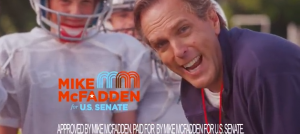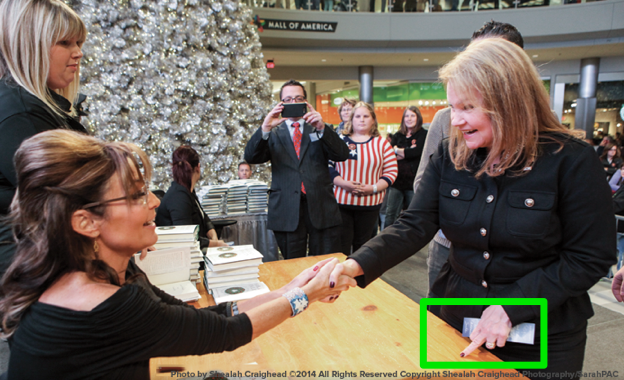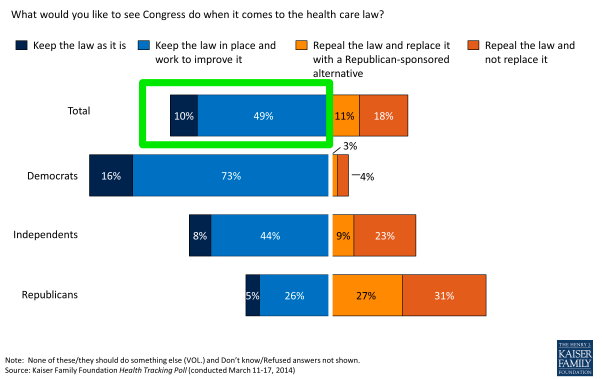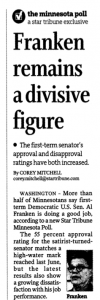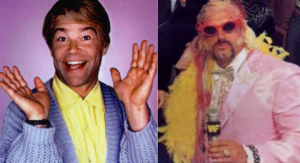So much political analysis is focused on the short-term: “Which side won yesterday’s news cycle.” But unless it’s the day before an election, such short-term analyses aren’t particularly meaningful.
 The more useful question to ask is this: “On the next Election Day, would I rather be playing the proponents’ or opponents’ hand?” Applying that question to the issue of MNsure and Obamacare, I’d much rather be playing the supporters’ hand.
The more useful question to ask is this: “On the next Election Day, would I rather be playing the proponents’ or opponents’ hand?” Applying that question to the issue of MNsure and Obamacare, I’d much rather be playing the supporters’ hand.
Public relations-wise, MNsure has definitely “lost” many a news cycle over the last several months. Security breaches, website crashes, protracted customer service waits, and data transfer blunders. And as we all know, when the going got tough, the tough got going, to a Costa Rican beach, a particularly damaging episode.
These things all hurt, and I don’t mean to diminish them. MNsure and Obamacare supporters have been dealt bad cards in recent days. If you’re only focused on the short-term history, it looks like reform supporters might have a very bad political hand to play in the 2014 elections.
But forget about December 2013 for a moment, and consider how things will look like on November 4, 2014.
What GOP Will Be Proposing To Eliminate In 2014
By Election Day 2014, eliminating the reforms will be a more difficult sell, because by that time the reforms will have touched millions of lives in pretty significant ways. Republican candidates will need to make the case “I will eliminate something that has…”
PAID MILLIONS IN REBATES. Produced millions of dollars in rebates paid by insurance companies to thousands of Minnesotans and millions of Americans, thanks to an Obamacare provision authored by Minnesota’s U.S. Senator Al Franken. The provision limits the proportion of premium dollars insurers can use for non-health care expenses, and requires that the difference be paid back in customer rebates.
HELPED THE MOST VULNERABLE MINNESOTANS. Got 95,000 of Minnesota’s most vulnerable citizens efficiently covered in Medicaid, including about 12,000 uninsured Minnesotans whose medical expenses were being shifted to insured Minnesotans.
COVERED UNINSURED YOUNG ADULTS. Covered 35,000 Minnesota young adults, who otherwise would have been uninsured and now are able to stay on their parents health policy until age 26.
MADE PRIVATE COVERAGE MORE FEASIBLE. Offered lower costs in the marketplace to 382,595 Minnesotans who are uninsured or otherwise eligible for subsidies.
HELPED CONTROL HEALTH EXPENDITURES. Contributed, along with state and health plan-driven reforms, to the slowest growth of health care expenditures since the state began tracking expenses in the mid 1990s, which will immensely help Minnesota’s future fiscal and economic outlook.
ELIMINATED CO-PAYS FOR PREVENTATIVE HEALTH SERVICES. More than 1.4 million Minnesotans no longer have to shell out co-pays for preventative health care, because of an Obamacare requirement. This includes things like flu shots, colonoscopies, mammograms and well-child check-ups.
DELIVERED LOWEST PREMIUMS IN THE NATION. Created a simple-to-understand — though still not simple to use — apples-to-apples insurance marketplace that has prompted competitors to offer Minnesota consumers the lowest insurance premiums in the nation.
ENDED PRE-EXISTING CONDITION BANS. Made it illegal for private insurance companies to deny coverage due to pre-existing health conditions, something that impacts many of the 2.3 million Minnesotans who have some type of pre-existing condition.
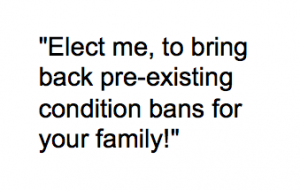 Again, I don’t intend to sugar coat the current situation. It’s been a rough few months for Obamacare and MNsure supporters. The exchange website, call center, and management problems need to be improved as soon as possible. Now most definitely is the winter of MNbamacare supporters’ discontent.
Again, I don’t intend to sugar coat the current situation. It’s been a rough few months for Obamacare and MNsure supporters. The exchange website, call center, and management problems need to be improved as soon as possible. Now most definitely is the winter of MNbamacare supporters’ discontent.
But come next fall, Republican candidates, who offer no viable health care reform plan of their own, will have a very difficult time making the case for elimination of reforms that have been producing strong benefits for millions of Minnesotans. “Elect me, to increase our rate of uninsurance again!” “Elect me, to eliminate what you want to work better.” “Elect me, to bring back pre-existing condition bans for your family!”
MNsure and Obamacare’s 2013 frailties aside, trying to take away those widespread benefits will be a very difficult political hand for the GOP to play in the 2014 elections.
– Loveland
Note: This post was also republished in MinnPost, and featured in Politics in Minnesota’s Best of the Blogs.
 Saint Paul, Minnesota – In news that could shake up Minnesota’s previously sleepy U.S. Senate contest, Republican candidate Mike McFadden announced today that he has landed the endorsement of his young daughter Molly McFadden.
Saint Paul, Minnesota – In news that could shake up Minnesota’s previously sleepy U.S. Senate contest, Republican candidate Mike McFadden announced today that he has landed the endorsement of his young daughter Molly McFadden.
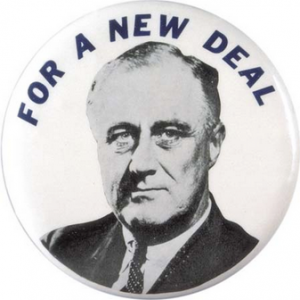 But progressives are also supposed to lead the way forward. The dictionary says a “progressive” is “a person advocating or implementing social reform or new, liberal ideas.”
But progressives are also supposed to lead the way forward. The dictionary says a “progressive” is “a person advocating or implementing social reform or new, liberal ideas.” Yet when GOP politicians endorse those two mutually exclusive positions, almost no political reporters note the absurdity of it. When reporters allow politicians to get away with simultaneously endorsing the part of Obamacare that outlaws pre-existing condition denials and opposing the part of Obamacare that mandates insurance coverage, they effectively allow those politicians to say something every bit as absurd as “I’m for capitalism, but I also support communism.”
Yet when GOP politicians endorse those two mutually exclusive positions, almost no political reporters note the absurdity of it. When reporters allow politicians to get away with simultaneously endorsing the part of Obamacare that outlaws pre-existing condition denials and opposing the part of Obamacare that mandates insurance coverage, they effectively allow those politicians to say something every bit as absurd as “I’m for capitalism, but I also support communism.”
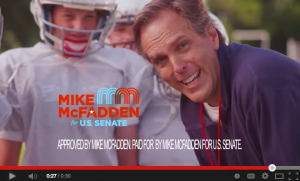

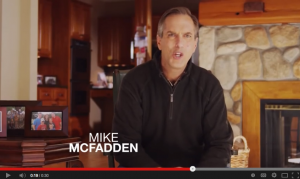 Note the tough, no-nonsense daddy image that McFadden’s political consultants are constructing.
Note the tough, no-nonsense daddy image that McFadden’s political consultants are constructing. 